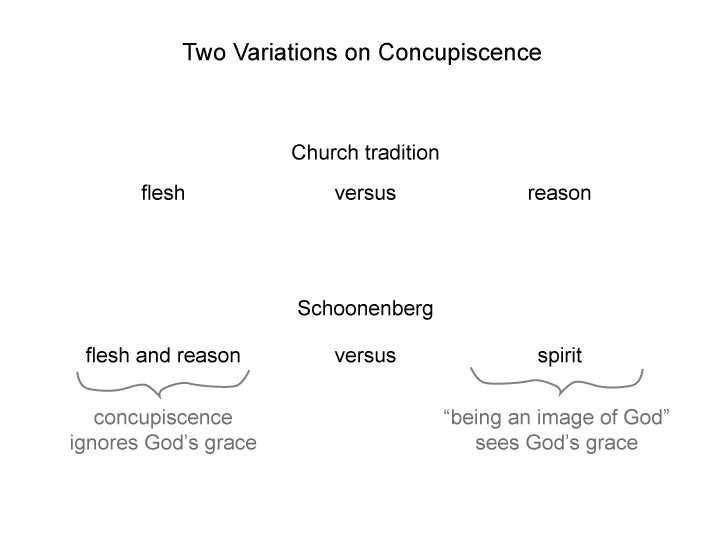Category Archives: Unveiling words
The first task or group concerns the semiotics of speech-alone talk. One of these would be about unveiling the hidden history of a word. This topic is addressed in chapters 2 and 12.
Man and Sin by Piet Schoonenberg (1964) 2.3 CG
Summary of text [comment] page 82
[At this point, ‘concupiscence’ is a word supported by two oppositions, one belonging to Church doctrine and one belonging to Schoonenberg.
The technical difference may be described, using the Greek opposition, as follows:
For Church doctrine, ‘flesh’ is different than ‘reason’. ‘Flesh’ is subject to ‘the state of being with Cupid (a pagan god of desire)’. The fancy word for this state is ‘concupiscence’.
For Schoonenberg’s speculation, ‘flesh and reason’ are distinct but inseparable. Both are different from ‘spirit’. Both ‘flesh and reason’ are subject to concupiscence. Concupiscence encompasses both material and immaterial desires, as well as personal and social conditions.]
Man and Sin by Piet Schoonenberg (1964) 2.3 CC
Summary of text [comment] page 82
[Paul and John’s letters try to make sense of the mythos of Jesus the Christ.
Yet, I see another movement, another mythos, opening before me. First century Greek, Roman and (most likely) Aramaic languages were changing. Schoonenberg did not see that opening. But, he did see a crucial point.]
Schoonenberg noted that the oppositions between ‘flesh’ and ‘spirit’ and between ‘the world’ and ‘the Father’, in Paul and John respectively, called for a new theology.
This new theology saw concupiscence, not only in man’s material nature, but also in his whole human being, including his being among other human beings.
‘Concupiscence’ encompasses both our (post-first-singularity human) material and immaterial natures, as well as our personal and social natures.
Man and Sin by Piet Schoonenberg (1964) 2.3 BV
[The mythos is this:
In speech-alone talk, the entire language may turn, like a flock of birds in flight or like a flock of birds over time.
This mythos touches base with two complementary insights, one from the evolution of talk and the other from a passage in Exodus.]
Man and Sin by Piet Schoonenberg (1964) 2.3 BS
Summary of text [comment] page 82
[Both Paul and John’s letters endeavored to make sense of the mythos of Jesus the Christ. Each author tried to figure out the Logos. The question before them was:
What was meaning, guarantee and message underlying this revelation?]
Man and Sin by Piet Schoonenberg (1964) 2.3 BQ
Summary of text [comment] page 82
[ The re-ordination of the symbolic order during the first century of Christianity applies to Greek as well.
The original Greek opposition between ‘flesh’ and ‘reason’ had the same drawbacks as the original Semitic opposition of ‘flesh’ and ‘God’s law (that is, what one felt in one’s bones)’.
The drawback, in an age of Empire, was that one’s reason and one’s blood & bones could betray the truth. They were not as reliable as once imagined. One could betray one’s own people, and one’s own God, through reason and blood & bones, just as easily as through flesh and … um … flesh.
Both metaphors were adopted by the ruling elites to fashion idols (of ‘who they were’).
In Greece, the rulers became ‘paragons of reason’.
In Israel, the rulers became ‘the blood and bones of Yahweh’s cult’.]
Man and Sin by Piet Schoonenberg (1964) 2.3 BP
Summary of text [comment] page 82
Schoonenberg considered ‘the flesh’ in the context of concupiscence and bondage.
He asked: How does this word appear in history?
The term ‘flesh’ derives in part from the Greek world. The Greeks came to see that ‘the flesh’ was opposed to ‘reason’.
In the Old Testament, ‘the flesh’ was opposed to ‘the Providence of God’.
[Notably, Schoonenberg did not mention the older opposition, flesh versus blood & bones. Obviously, blood & bones were attuned to the Providence of God.]
In the New Testament, flesh joins desire as ‘belonging to the world’ as opposed to ‘belonging to the Father (1 John 2:16)’.
Schoonenberg concluded that ‘concupiscence’ is a pejorative term that represents the tendency toward sin within man or mankind as it stands under sin.
Man and Sin by Piet Schoonenberg (1964) 2.3 BO
[If this is the mythos, then what is the logos?
What is the reference to be constructed on ‘the miracle of Paul’s insightful use of words ‘flesh’ and ‘spirit’?
If the word ‘flesh’ veils the history of ‘flesh and bones’, then a discussion of concupiscence does not follow, as it does here, in Schoonenberg’s book.
Instead, a discussion of the nested form self-justification3( concupiscence2(1)) might better apply. A similar discussion appears in my blogs on Ted Peter’s book Radical Evil.
But even that is not enough. Here an even bigger question:
What does it mean to live in a world where the meanings of words can reconfigure like a flock of birds as the seasons change?]
Man and Sin by Piet Schoonenberg (1964) 2.3 BN
Summary of text [comment] page 81
[Speech-alone words are birds in flight.
Paul searched for words in a language that was changing, like a flock of birds at the change of season.
Every bird veiled its own history. Every bird differed from every other bird.
The entire flock flew differently, each bird in its own way.
Paul spied one set of differences, ‘flesh as opposed to spirit’.
He seized upon it, freezing the moment, as well as each bird’s veiled history.]
Man and Sin by Piet Schoonenberg (1964) 2.3 BM
[This is a core insight in An Archaeology of the Fall.
We always feel, in our bones, that words are referential.
We always feel that words mean what they say.
We always project reference into spoken and written words.
Then, we learn that even the word ‘bones’ is simply a placeholder in a system of differences.
The symbolic order of speech alone talk is not anchored.
Horrors.]

